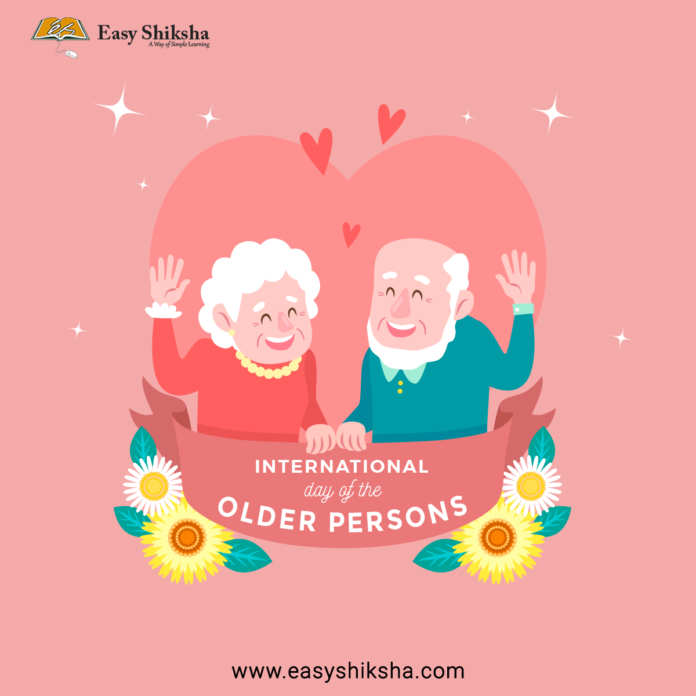History
On December 14, 1990, the United Nations General Assembly voted to establish October 1 as International Day of Older Persons as set out in Resolution 45/106. The holiday was observed for the first time on October 1, 1991. The holiday is celebrated with awareness of issues affecting the elderly, such as elder abuse. This day is also a celebration of the contributions made by older people in the community. This holiday is similar to the national grandparents’ day in the United States and Canada as well as the Double Ninth Festival in China and Respect for the Aged Day in Japan. The festival focuses on ageing organizations and the United Nations Aging Program.
 Online Courses with Certification
Online Courses with Certification
When is the International Day of Older Persons observed?
Every year 01 October is celebrated as International Day of Elderly with the aim of curbing the injustice and mistreatment of the elderly in the world.
International Older’s Day
International Day of Older Persons is known by different names such as:- ‘International Day of Older Persons’ or ‘International Senior Citizen Day’ or ‘World Adult Day’ or ‘International Day of Older Persons’ etc. On this occasion, it is necessary to respect our senior citizens and think about them.

History of International Day of Veterans
On December 14, 1990, the United Nations decided that every year on October 01, the United Nations decided to make the elderly aware of their rights as well as to curb the injustice and abuse of the elderly all over the world. Celebrated as Veterans Day. With this, the elderly will also realize their importance and apart from the society, they will also be able to get their proper place in the family. Veterans Day was first celebrated on October 01, 1991 and since then it is celebrated on this day every year.

Important Announcement – EasyShiksha has now started Online Internship Program “Ab India Sikhega Ghar Se”

Q. Are EasyShiksha's internships truly free?
Yes, all internships offered by EasyShiksha are completely free of charge.
Q. How can I apply for an internship with EasyShiksha?
You can apply by visiting our website, browsing available internships, and following the application instructions provided.
Q. What types of internships are available through EasyShiksha?
EasyShiksha offers a wide range of internships across technology, business, marketing, healthcare, and more. Opportunities are continuously updated.
Q. Will I receive a certificate upon completing an internship?
Yes, upon successful completion, you will receive a certificate recognizing your participation and achievements.
Q. Are EasyShiksha's internship certificates recognized by universities and employers?
Yes, the certificates are recognized by universities, colleges, and employers worldwide.
Q. Is the download of certificates free or paid?
Access to internships and courses is free, but there is a small fee to download certificates, covering administrative costs.
Q. When can I start the course?
You can choose any course and start immediately without delay.
Q. What are the course and session timings?
These are fully online courses. You can learn at any time and pace. We recommend following a routine, but it depends on your schedule.
Q. What will happen when my course is over?
After completion, you will have lifetime access to the course for future reference.
Q. Can I download the notes and study material?
Yes, you can access and download course materials and have lifetime access for future reference.
Q. What software/tools would be needed for the course?
All necessary software/tools will be shared during the training as needed.
Q. I’m unable to make a payment. What should I do?
Try using a different card or account. If the problem persists, email us at info@easyshiksha.com.
Q. Do I get the certificate in hard copy?
No, only a soft copy is provided, which can be downloaded and printed if required.
Q. The payment got deducted but shows “failed”. What to do?
Technical errors may cause this. The deducted amount will be returned to your account in 7-10 working days.
Q. Payment was successful but dashboard shows ‘Buy Now’?
Sometimes payment reflection is delayed. If it takes longer than 30 minutes, email info@easyshiksha.com with the payment screenshot.
Q. What is the refund policy?
If you face technical issues, you can request a refund. No refunds are issued once the certificate has been generated.
Q. Can I enroll in a single course?
Yes, select the course of interest, fill in the details, make payment, and start learning. You will also earn a certificate.
Q. My questions are not listed above. I need further help.
Contact us at info@easyshiksha.com for further assistance.
Status of Elderly in India
Although many laws have been made in India to protect and empower the elderly, even today they are not followed properly. The Central Government has formulated a National Policy for Older Members in the year 1999 to promote the health and well-being of senior citizens in India. Under which individuals are encouraged to make arrangements for themselves and for the old age of their spouses and at the same time efforts are made to encourage the family members to take care of the elderly members.
Along with this, the Maintenance of Parents and Senior Citizens Bill was passed in Parliament in 2007. In this, provision has been made for the maintenance of parents, the establishment of old age homes, provision of medical facilities and protection of life and property of senior citizens.
Theme Of 2020
The theme of the United Nations International Day of Older Persons 2021 under the theme “Equity Equity for All Ages” highlights the need for older people to participate in accessing the most important church in the world.

The fourth industrial revolution marked by new digital innovation, characterized by growing growth has transformed all sectors of society including how we live, work and relate. Technological advances offer great hope of accelerating progress towards sustainable development goals (SDGs). However, half of the world population is out of line, and the biggest difference is seen between most countries and developed countries (87% and 19% respectively) (ITU Facts and Figures 2020). Recent reports from the International Telecommunications Union (ITU) show that women and older people are experiencing digital inequality on a much larger scale than other groups in society; they may not have access to technology or often do not fully benefit from the opportunities offered by technological advances.
Meanwhile, as efforts to connect more people continue, new dangers have arisen. For example, cybercrime and false information threaten the rights, privacy and safety of older persons. The rapid adoption of digital technology has surpassed policy and governance at national, regional, and international levels. The Secretary-General’s Roadmap seeks to address these challenges by recommending concrete steps for the optimal use of these technologies and minimizing their risks.
ALSO READ: first-aid-measures-for-common-injuries
Get Course: Learn-SQL-Tutorial-for-Beginners

































































